Related Research Articles

The People's Army of Vietnam (PAVN), officially the Vietnam People's Army, also recognized as the Vietnamese Army or the People's Army, is the national military force of the Socialist Republic of Vietnam and the armed wing of the ruling Communist Party of Vietnam (CPV). The PAVN is a part of the Vietnam People's Armed Forces and includes: Ground Force, Navy, Air Force, Border Guard and Coast Guard. Vietnam does not have a separate Ground Force or Army service. All ground troops, army corps, military districts and special forces belong to the Ministry of National Defence, directly under the command of the CPV Central Military Commission, the Minister of National Defence, and the General Staff of the Vietnam People's Army. The military flag of the PAVN is the National flag of the Socialist Republic of Vietnam defaced with the motto Quyết thắng added in yellow at the top left.

Võ Nguyên Giáp was a militarily self-taught general of the People's Army of Vietnam (PAVN), communist revolutionary and politician. Regarded as one of the greatest military strategists of the 20th century, Giáp commanded Vietnamese communist forces in various wars. He served as the military commander of the Việt Minh and later the PAVN from 1941 to 1972, as the minister of defence of the Democratic Republic of Vietnam and later Socialist Republic of Vietnam in 1946–1947 and from 1948 to 1980, and as deputy prime minister from 1955 to 1991. He was also a member of the Politburo of the Communist Party of Vietnam.

The Battle of Điện Biên Phủ was a climactic confrontation of the First Indochina War that took place between 13 March and 7 May 1954. It was fought between the French Union's colonial Far East Expeditionary Corps and Viet Minh communist revolutionaries. The United States was officially not a party to the war, but it was secretly involved by providing financial and material aid to the French Union, which included CIA contracted American personnel participating in the battle. The People's Republic of China and the Soviet Union similarly provided vital support to the Viet Minh, including most of their artillery and ammunition.

The Viet Cong was an epithet to call the communist movement and united front organization in South Vietnam, Laos and Cambodia. Formally organized as and led by the National Liberation Front of South Vietnam, it fought under the direction of North Vietnam against the South Vietnamese and United States governments during the Vietnam War. The organization had both guerrilla and regular army units, as well as a network of cadres who organized and mobilized peasants in the territory the Viet Cong controlled. During the war, communist fighters and some anti-war activists claimed that the Viet Cong was an insurgency indigenous to the South, while the U.S. and South Vietnamese governments portrayed the group as a tool of North Vietnam. It was later conceded by the modern Vietnamese communist leadership that the movement was actually under the North Vietnamese political and military leadership, aiming to unify Vietnam under a single banner.

Psychological warfare (PSYWAR), or the basic aspects of modern psychological operations (PsyOp), has been known by many other names or terms, including Military Information Support Operations (MISO), Psy Ops, political warfare, "Hearts and Minds", and propaganda. The term is used "to denote any action which is practiced mainly by psychological methods with the aim of evoking a planned psychological reaction in other people".
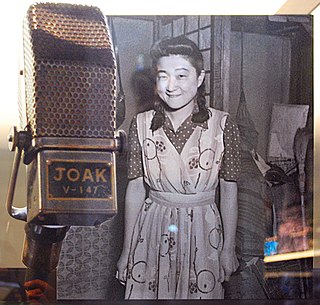
Tokyo Rose was a name given by Allied troops in the South Pacific during World War II to all female English-speaking radio broadcasters of Japanese propaganda. The programs were broadcast in the South Pacific and North America to demoralize Allied forces abroad and their families at home by emphasizing troops' wartime difficulties and military losses. Several female broadcasters operated using different aliases and in different cities throughout the territories occupied by the Japanese Empire, including Tokyo, Manila, and Shanghai. The name "Tokyo Rose" was never actually used by any Japanese broadcaster, but it first appeared in U.S. newspapers in the context of these radio programs during 1943.

The First Indochina War was fought between France and Việt Minh, and their respective allies, from 19 December 1946 until 20 July 1954. Việt Minh was led by Võ Nguyên Giáp and Hồ Chí Minh. Most of the fighting took place in Tonkin in Northern Vietnam, although the conflict engulfed the entire country and also extended into the neighboring French Indochina protectorates of Laos and Cambodia.

The August Revolution, also known as the August General Uprising, was a revolution launched by the Việt Minh against the Empire of Vietnam and the Empire of Japan in the latter half of August 1945. The Việt Minh, led by the Indochinese Communist Party, was created in 1941 and designed to appeal to a wider population than what the communists could command.
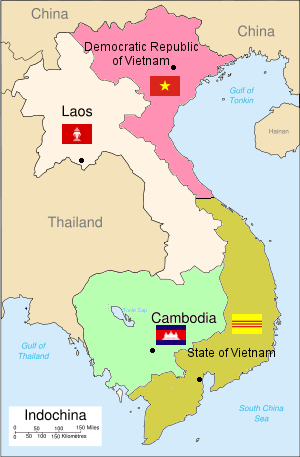
The Geneva Conference was a conference that was intended to settle outstanding issues resulting from the Korean War and the First Indochina War and involved several nations. It took place in Geneva, Switzerland, from 26 April to 20 July 1954. The part of the conference on the Korean question ended without adopting any declarations or proposals and so is generally considered less relevant. On the other hand, the Geneva Accords that dealt with the dismantling of French Indochina proved to have long-lasting repercussions. The crumbling of the French colonial empire in Southeast Asia led to the formation of the states of the Democratic Republic of Vietnam, the State of Vietnam, the Kingdom of Cambodia, and the Kingdom of Laos. Three agreements about French Indochina, covering Cambodia, Laos, and Vietnam, were signed on 21 July 1954 and took effect two days later.
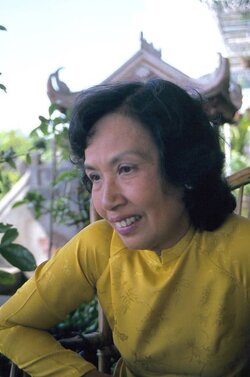
Trịnh Thị Ngọ, also known as Thu Hương and Hanoi Hannah, was a Vietnamese radio personality best known for her work during the Vietnam War, when she made English-language broadcasts for North Vietnam directed at United States troops.
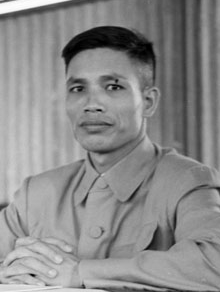
Văn Tiến Dũng was a Vietnamese general in the People's Army of Vietnam (PAVN), PAVN chief of staff (1954–74); PAVN commander in chief (1974–80); member of the Central Military–Party Committee (CMPC) (1984–86) and Socialist Republic of Vietnam defense minister (1980–87).

Television in Vietnam began to appear in the mid-1960s in Saigon, with the appearance of Saigon Television Station. In 1970, in the North, Voice of Vietnam broadcast the first test television program. In the late 1970s, color television was introduced and broadcast experimentally. Today, television in Vietnam is available in many modes of broadcasting, with many national and local channels, broadcast or pay with more than 200 channels available to viewers. Vietnam completed the digital television transitions on December 28, 2020.

The Voice of Vietnam is the Vietnamese national radio broadcaster. Directly controlled by the government of Vietnam, it is tasked propagating the policies of the Party and the laws of the state.

The Declaration of independence of the Democratic Republic of Vietnam was written by Hồ Chí Minh, and announced in public at the Ba Đình flower garden in Hanoi on September 2, 1945. It led to the foundation of the Democratic Republic of Vietnam, replacing the Nguyen dynasty.

North Vietnam, officially the Democratic Republic of Vietnam, was a socialist state in Southeast Asia that existed from 1945 to 1976, with formal sovereignty being fully recognized in 1954. A member of the Eastern Bloc, it opposed the French-backed State of Vietnam and later the Western-allied Republic of Vietnam. North Vietnam emerged victorious over South Vietnam in 1975 and ceased to exist the following year when it unified with the south to become the current Socialist Republic of Vietnam.

Hoàng Văn Thái, born Hoàng Văn Xiêm, was a Vietnamese Army General and a communist political figure. His hometown was Tây An, Tiền Hải District, Thái Bình Province. During the Tết Offensive, he was the highest senior North Vietnamese officer in South Vietnam. He was the first chief of staff of the Vietnam People's Army, and was responsible for key military forces in North Vietnam. He was also Chief of Staff in the Battle of Điện Biên Phủ.
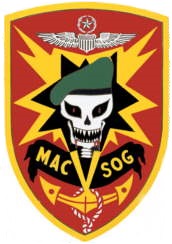
The Sacred Sword of the Patriots League (SSPL) (Mặt trận gươm thiêng ái quốc) was a sustained black operation that originated in the Central Intelligence Agency and was carried out by the Military Assistance Command, Vietnam – Studies and Observations Group (MACV-SOG) during the Vietnam War. It involved a combination of psychological warfare (PSYWAR) and psychological operations (PSYOP), today known as military information support operations (MISO).

Tiana Alexandra-Silliphant is a Vietnamese-American actress and filmmaker. Her indie movie From Hollywood to Hanoi [1] was the first American documentary feature film shot in Vietnam by a Vietnamese-American. Tiana's life's work, Why Viet Nam?, is about her personal story as a child of war and a widow of peace.
Radio propaganda is propaganda aimed at influencing attitudes towards a certain cause or position, delivered through radio broadcast. The power of radio propaganda came from its revolutionary nature. The radio, like later technological advances in the media, allowed information to be transmitted quickly and uniformly to vast populations. Internationally, the radio was an early and powerful recruiting tool for propaganda campaigns.

General Võ Nguyên Giáp, who led the Viet Minh forces during the First Indochina War and the North Vietnamese forces during the Vietnam War, died on October 4, 2013, after a long stay at the 108 Hospital in Hanoi. The Vietnam News Agency did not officially confirm it until a day later, when they announced a two-day national funeral to be held the following week, on October 12 and 13, which would be presided by all top-ranking government officials. His body was laid in state at the National Funeral House in Hanoi on October 12, before being buried in his home province of Quảng Bình the following day. The funeral was broadcast live nationwide by the state broadcasters VTV and VOV.
References
- ↑ "Historic Milestones". Radio the Voice of Vietnam website. Radio the Voice of Vietnam. Retrieved 14 April 2012.
- ↑ Dickerson, Floyd F. (2011). Choices Guide Life's Journey. Publish America.
- ↑ Lamb, David (4 April 1998). "'Hanoi Hannah' Fondly Remembers Her Role". Los Angeles Times. ISSN 0458-3035. Retrieved 4 October 2016.